Case Study: Talent Management Strategy for ABC Distribution's Growth
VerifiedAdded on 2023/06/14
|9
|2073
|441
Case Study
AI Summary
This case study examines the implementation of a strategic talent management process within ABC Distribution, a rapidly growing distribution company. It addresses the meaning of talent for executive managers, methods for gaining a better vision of talent, and alignment of talent views across management levels. The study identifies challenges such as succession planning and internationalization, which hinder talent development. It explores reasons for employee turnover, including work-life imbalance and misalignment, and the adverse impact of high rotation levels on talent management. Recommendations are provided for retaining talent through organizational culture, rewards, and HR tools. The case emphasizes the importance of technology, clear communication, talent recognition programs, and organizational structure to improve team congruence and drive the organization towards success, advocating for a strategic vision aligned with the company's expansion goals. This assignment is available on Desklib, a platform offering study tools and resources for students.
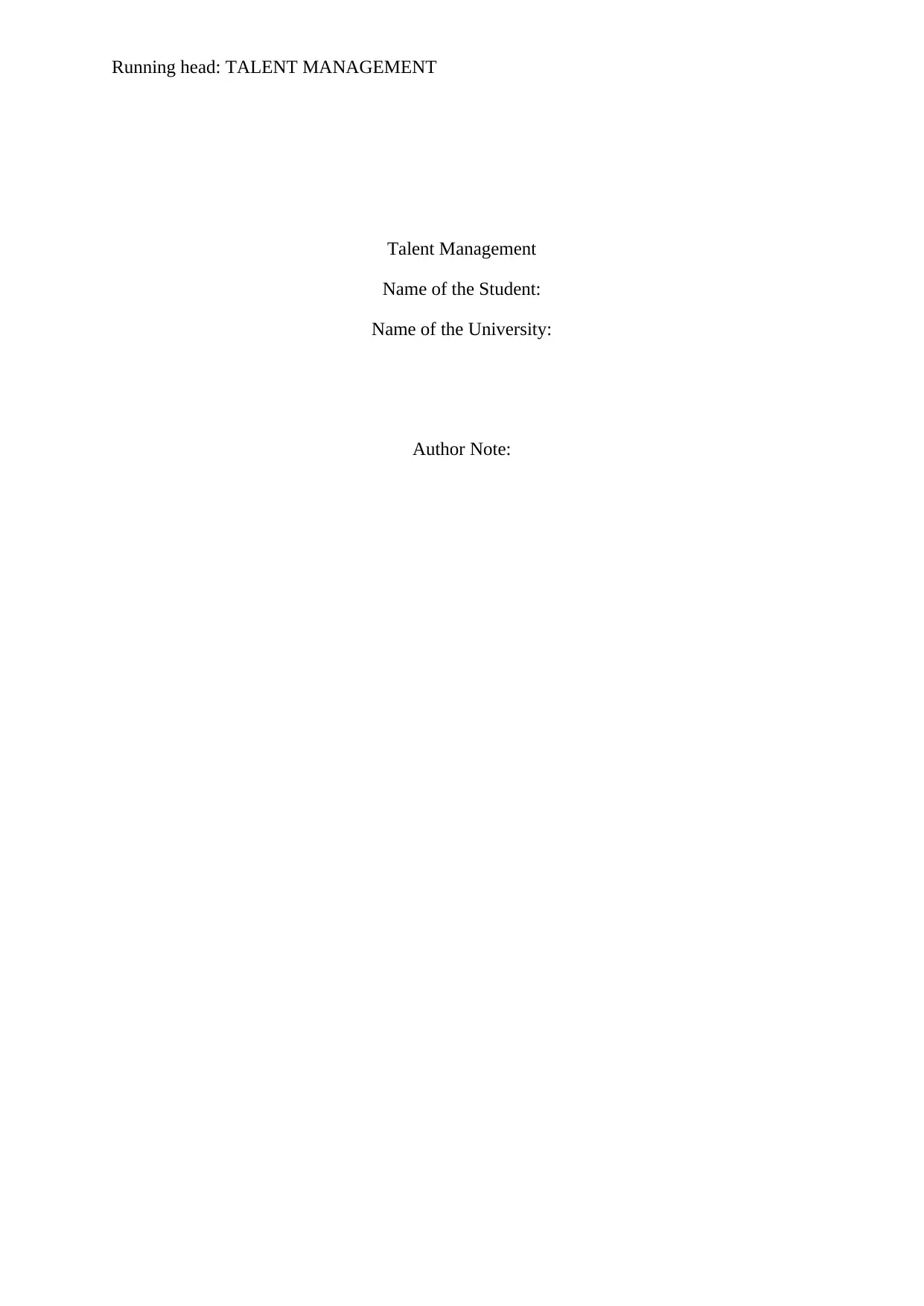
Running head: TALENT MANAGEMENT
Talent Management
Name of the Student:
Name of the University:
Author Note:
Talent Management
Name of the Student:
Name of the University:
Author Note:
Paraphrase This Document
Need a fresh take? Get an instant paraphrase of this document with our AI Paraphraser
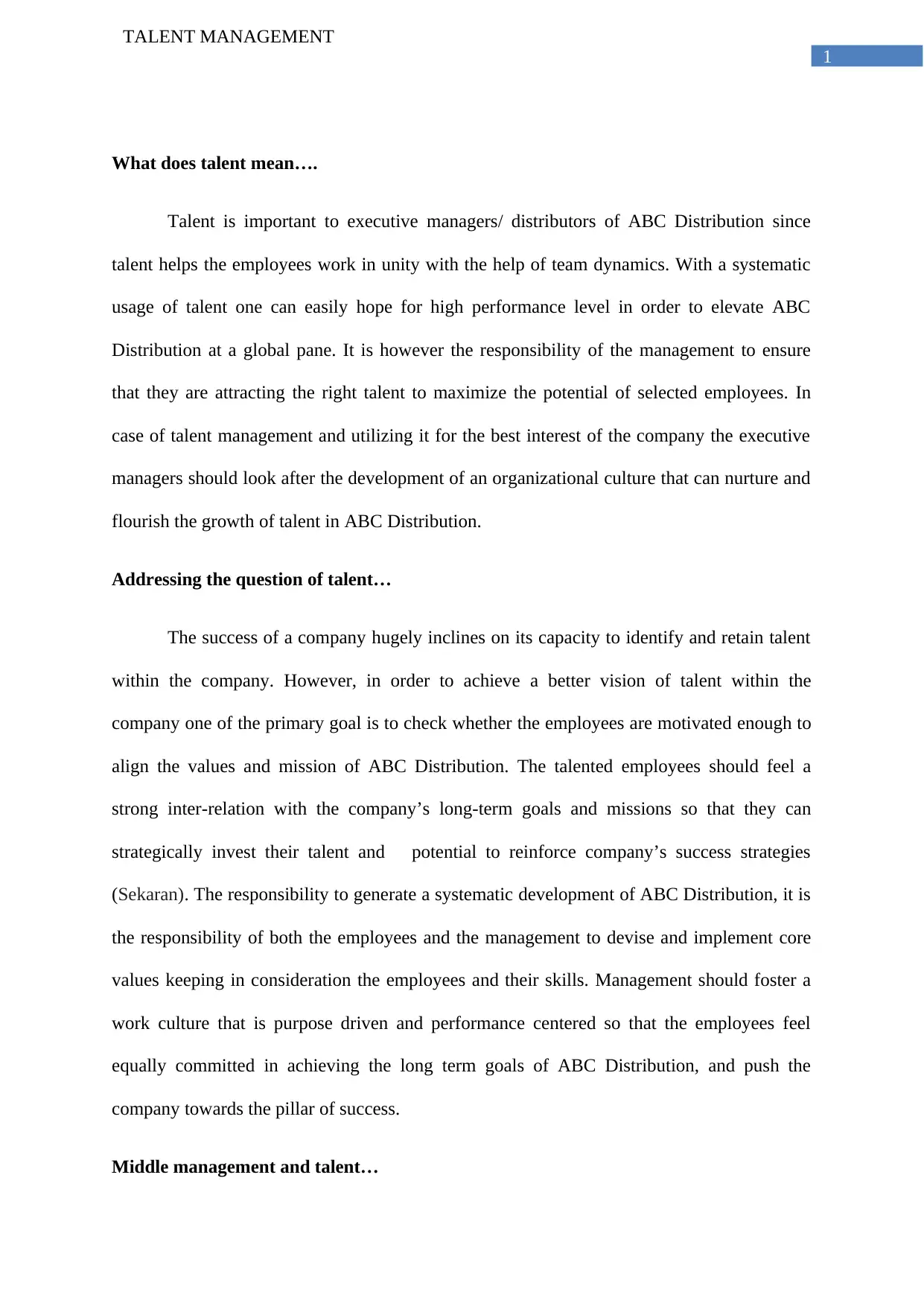
1
TALENT MANAGEMENT
What does talent mean….
Talent is important to executive managers/ distributors of ABC Distribution since
talent helps the employees work in unity with the help of team dynamics. With a systematic
usage of talent one can easily hope for high performance level in order to elevate ABC
Distribution at a global pane. It is however the responsibility of the management to ensure
that they are attracting the right talent to maximize the potential of selected employees. In
case of talent management and utilizing it for the best interest of the company the executive
managers should look after the development of an organizational culture that can nurture and
flourish the growth of talent in ABC Distribution.
Addressing the question of talent…
The success of a company hugely inclines on its capacity to identify and retain talent
within the company. However, in order to achieve a better vision of talent within the
company one of the primary goal is to check whether the employees are motivated enough to
align the values and mission of ABC Distribution. The talented employees should feel a
strong inter-relation with the company’s long-term goals and missions so that they can
strategically invest their talent and potential to reinforce company’s success strategies
(Sekaran). The responsibility to generate a systematic development of ABC Distribution, it is
the responsibility of both the employees and the management to devise and implement core
values keeping in consideration the employees and their skills. Management should foster a
work culture that is purpose driven and performance centered so that the employees feel
equally committed in achieving the long term goals of ABC Distribution, and push the
company towards the pillar of success.
Middle management and talent…
TALENT MANAGEMENT
What does talent mean….
Talent is important to executive managers/ distributors of ABC Distribution since
talent helps the employees work in unity with the help of team dynamics. With a systematic
usage of talent one can easily hope for high performance level in order to elevate ABC
Distribution at a global pane. It is however the responsibility of the management to ensure
that they are attracting the right talent to maximize the potential of selected employees. In
case of talent management and utilizing it for the best interest of the company the executive
managers should look after the development of an organizational culture that can nurture and
flourish the growth of talent in ABC Distribution.
Addressing the question of talent…
The success of a company hugely inclines on its capacity to identify and retain talent
within the company. However, in order to achieve a better vision of talent within the
company one of the primary goal is to check whether the employees are motivated enough to
align the values and mission of ABC Distribution. The talented employees should feel a
strong inter-relation with the company’s long-term goals and missions so that they can
strategically invest their talent and potential to reinforce company’s success strategies
(Sekaran). The responsibility to generate a systematic development of ABC Distribution, it is
the responsibility of both the employees and the management to devise and implement core
values keeping in consideration the employees and their skills. Management should foster a
work culture that is purpose driven and performance centered so that the employees feel
equally committed in achieving the long term goals of ABC Distribution, and push the
company towards the pillar of success.
Middle management and talent…
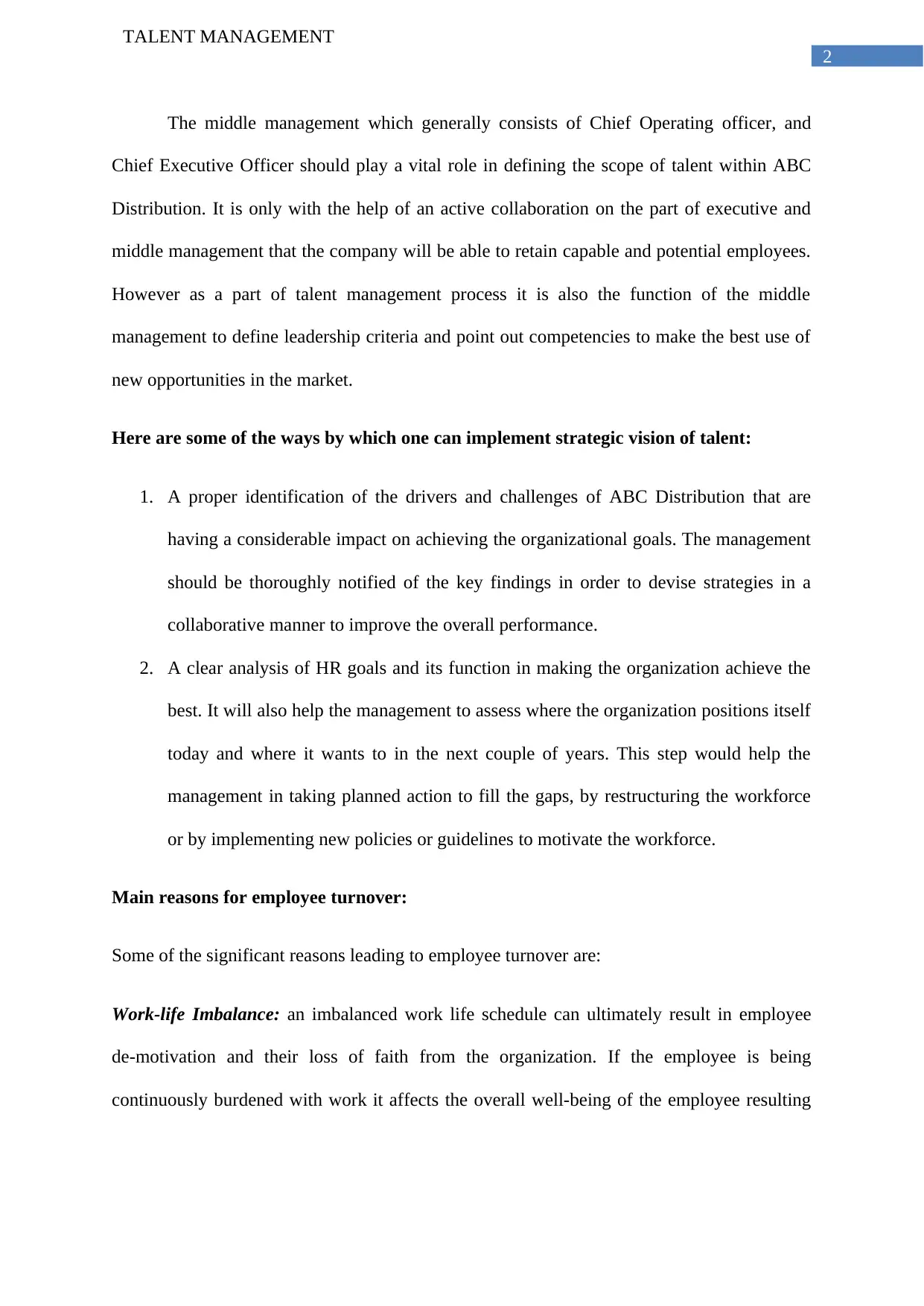
2
TALENT MANAGEMENT
The middle management which generally consists of Chief Operating officer, and
Chief Executive Officer should play a vital role in defining the scope of talent within ABC
Distribution. It is only with the help of an active collaboration on the part of executive and
middle management that the company will be able to retain capable and potential employees.
However as a part of talent management process it is also the function of the middle
management to define leadership criteria and point out competencies to make the best use of
new opportunities in the market.
Here are some of the ways by which one can implement strategic vision of talent:
1. A proper identification of the drivers and challenges of ABC Distribution that are
having a considerable impact on achieving the organizational goals. The management
should be thoroughly notified of the key findings in order to devise strategies in a
collaborative manner to improve the overall performance.
2. A clear analysis of HR goals and its function in making the organization achieve the
best. It will also help the management to assess where the organization positions itself
today and where it wants to in the next couple of years. This step would help the
management in taking planned action to fill the gaps, by restructuring the workforce
or by implementing new policies or guidelines to motivate the workforce.
Main reasons for employee turnover:
Some of the significant reasons leading to employee turnover are:
Work-life Imbalance: an imbalanced work life schedule can ultimately result in employee
de-motivation and their loss of faith from the organization. If the employee is being
continuously burdened with work it affects the overall well-being of the employee resulting
TALENT MANAGEMENT
The middle management which generally consists of Chief Operating officer, and
Chief Executive Officer should play a vital role in defining the scope of talent within ABC
Distribution. It is only with the help of an active collaboration on the part of executive and
middle management that the company will be able to retain capable and potential employees.
However as a part of talent management process it is also the function of the middle
management to define leadership criteria and point out competencies to make the best use of
new opportunities in the market.
Here are some of the ways by which one can implement strategic vision of talent:
1. A proper identification of the drivers and challenges of ABC Distribution that are
having a considerable impact on achieving the organizational goals. The management
should be thoroughly notified of the key findings in order to devise strategies in a
collaborative manner to improve the overall performance.
2. A clear analysis of HR goals and its function in making the organization achieve the
best. It will also help the management to assess where the organization positions itself
today and where it wants to in the next couple of years. This step would help the
management in taking planned action to fill the gaps, by restructuring the workforce
or by implementing new policies or guidelines to motivate the workforce.
Main reasons for employee turnover:
Some of the significant reasons leading to employee turnover are:
Work-life Imbalance: an imbalanced work life schedule can ultimately result in employee
de-motivation and their loss of faith from the organization. If the employee is being
continuously burdened with work it affects the overall well-being of the employee resulting
⊘ This is a preview!⊘
Do you want full access?
Subscribe today to unlock all pages.

Trusted by 1+ million students worldwide
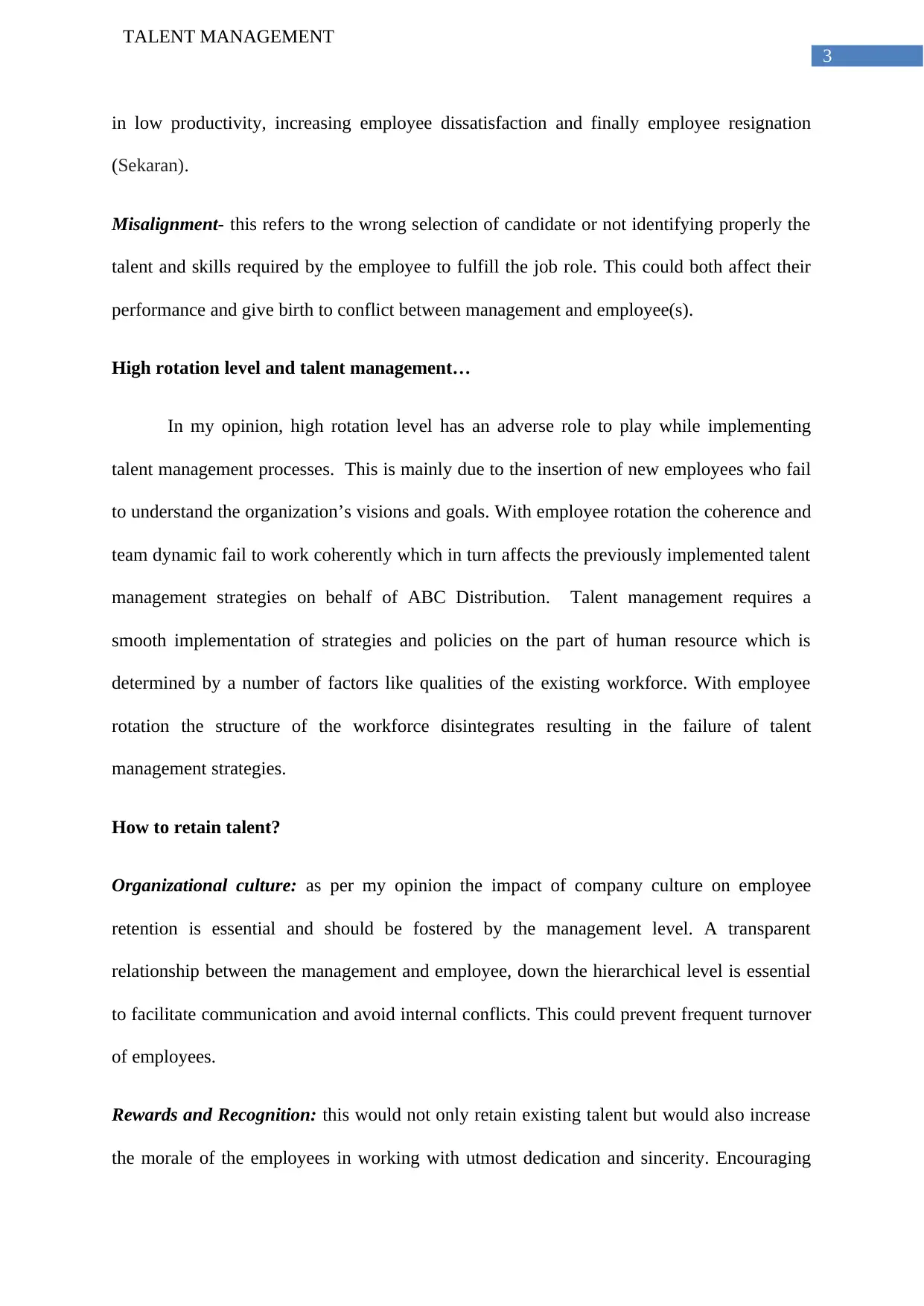
3
TALENT MANAGEMENT
in low productivity, increasing employee dissatisfaction and finally employee resignation
(Sekaran).
Misalignment- this refers to the wrong selection of candidate or not identifying properly the
talent and skills required by the employee to fulfill the job role. This could both affect their
performance and give birth to conflict between management and employee(s).
High rotation level and talent management…
In my opinion, high rotation level has an adverse role to play while implementing
talent management processes. This is mainly due to the insertion of new employees who fail
to understand the organization’s visions and goals. With employee rotation the coherence and
team dynamic fail to work coherently which in turn affects the previously implemented talent
management strategies on behalf of ABC Distribution. Talent management requires a
smooth implementation of strategies and policies on the part of human resource which is
determined by a number of factors like qualities of the existing workforce. With employee
rotation the structure of the workforce disintegrates resulting in the failure of talent
management strategies.
How to retain talent?
Organizational culture: as per my opinion the impact of company culture on employee
retention is essential and should be fostered by the management level. A transparent
relationship between the management and employee, down the hierarchical level is essential
to facilitate communication and avoid internal conflicts. This could prevent frequent turnover
of employees.
Rewards and Recognition: this would not only retain existing talent but would also increase
the morale of the employees in working with utmost dedication and sincerity. Encouraging
TALENT MANAGEMENT
in low productivity, increasing employee dissatisfaction and finally employee resignation
(Sekaran).
Misalignment- this refers to the wrong selection of candidate or not identifying properly the
talent and skills required by the employee to fulfill the job role. This could both affect their
performance and give birth to conflict between management and employee(s).
High rotation level and talent management…
In my opinion, high rotation level has an adverse role to play while implementing
talent management processes. This is mainly due to the insertion of new employees who fail
to understand the organization’s visions and goals. With employee rotation the coherence and
team dynamic fail to work coherently which in turn affects the previously implemented talent
management strategies on behalf of ABC Distribution. Talent management requires a
smooth implementation of strategies and policies on the part of human resource which is
determined by a number of factors like qualities of the existing workforce. With employee
rotation the structure of the workforce disintegrates resulting in the failure of talent
management strategies.
How to retain talent?
Organizational culture: as per my opinion the impact of company culture on employee
retention is essential and should be fostered by the management level. A transparent
relationship between the management and employee, down the hierarchical level is essential
to facilitate communication and avoid internal conflicts. This could prevent frequent turnover
of employees.
Rewards and Recognition: this would not only retain existing talent but would also increase
the morale of the employees in working with utmost dedication and sincerity. Encouraging
Paraphrase This Document
Need a fresh take? Get an instant paraphrase of this document with our AI Paraphraser
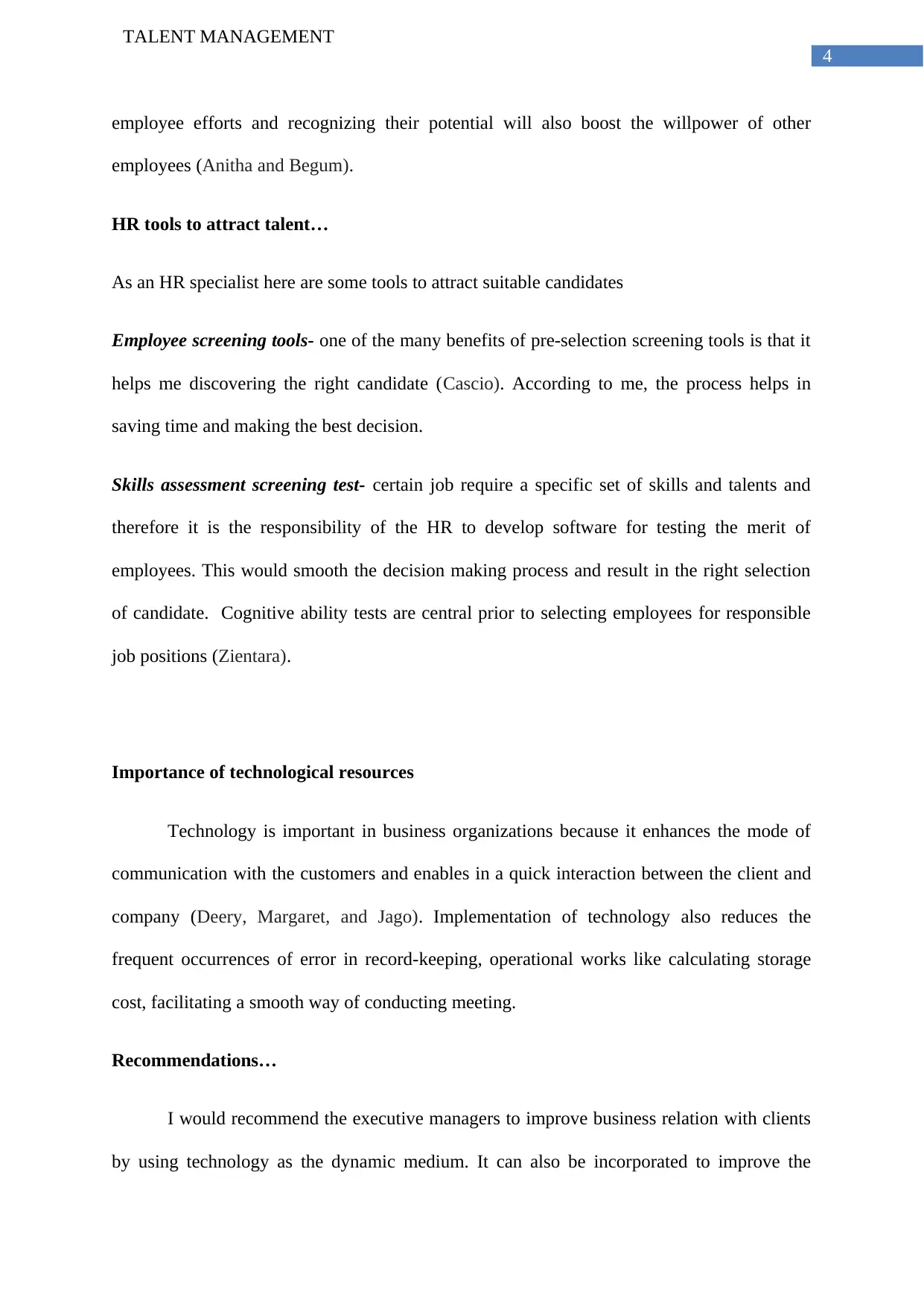
4
TALENT MANAGEMENT
employee efforts and recognizing their potential will also boost the willpower of other
employees (Anitha and Begum).
HR tools to attract talent…
As an HR specialist here are some tools to attract suitable candidates
Employee screening tools- one of the many benefits of pre-selection screening tools is that it
helps me discovering the right candidate (Cascio). According to me, the process helps in
saving time and making the best decision.
Skills assessment screening test- certain job require a specific set of skills and talents and
therefore it is the responsibility of the HR to develop software for testing the merit of
employees. This would smooth the decision making process and result in the right selection
of candidate. Cognitive ability tests are central prior to selecting employees for responsible
job positions (Zientara).
Importance of technological resources
Technology is important in business organizations because it enhances the mode of
communication with the customers and enables in a quick interaction between the client and
company (Deery, Margaret, and Jago). Implementation of technology also reduces the
frequent occurrences of error in record-keeping, operational works like calculating storage
cost, facilitating a smooth way of conducting meeting.
Recommendations…
I would recommend the executive managers to improve business relation with clients
by using technology as the dynamic medium. It can also be incorporated to improve the
TALENT MANAGEMENT
employee efforts and recognizing their potential will also boost the willpower of other
employees (Anitha and Begum).
HR tools to attract talent…
As an HR specialist here are some tools to attract suitable candidates
Employee screening tools- one of the many benefits of pre-selection screening tools is that it
helps me discovering the right candidate (Cascio). According to me, the process helps in
saving time and making the best decision.
Skills assessment screening test- certain job require a specific set of skills and talents and
therefore it is the responsibility of the HR to develop software for testing the merit of
employees. This would smooth the decision making process and result in the right selection
of candidate. Cognitive ability tests are central prior to selecting employees for responsible
job positions (Zientara).
Importance of technological resources
Technology is important in business organizations because it enhances the mode of
communication with the customers and enables in a quick interaction between the client and
company (Deery, Margaret, and Jago). Implementation of technology also reduces the
frequent occurrences of error in record-keeping, operational works like calculating storage
cost, facilitating a smooth way of conducting meeting.
Recommendations…
I would recommend the executive managers to improve business relation with clients
by using technology as the dynamic medium. It can also be incorporated to improve the
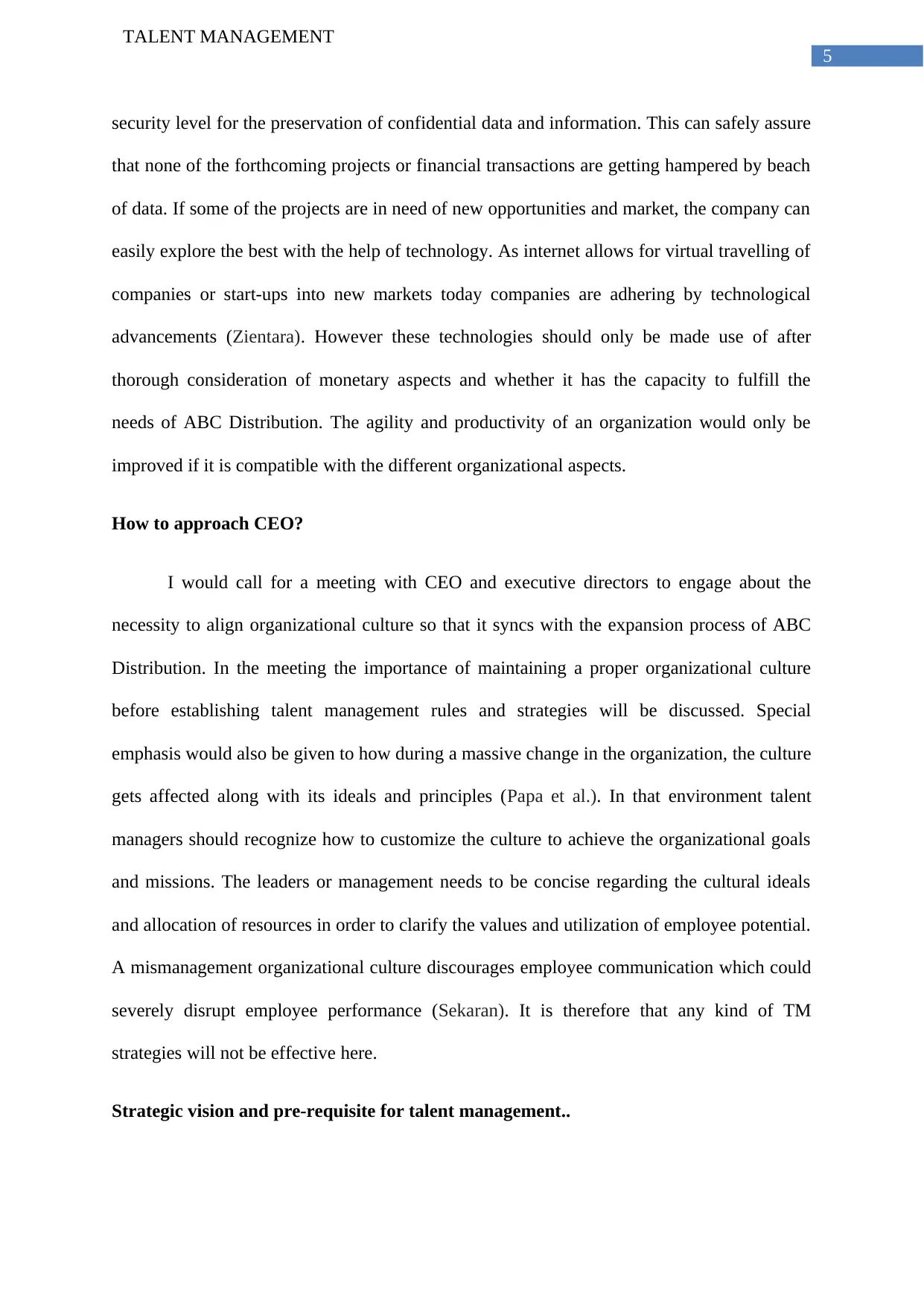
5
TALENT MANAGEMENT
security level for the preservation of confidential data and information. This can safely assure
that none of the forthcoming projects or financial transactions are getting hampered by beach
of data. If some of the projects are in need of new opportunities and market, the company can
easily explore the best with the help of technology. As internet allows for virtual travelling of
companies or start-ups into new markets today companies are adhering by technological
advancements (Zientara). However these technologies should only be made use of after
thorough consideration of monetary aspects and whether it has the capacity to fulfill the
needs of ABC Distribution. The agility and productivity of an organization would only be
improved if it is compatible with the different organizational aspects.
How to approach CEO?
I would call for a meeting with CEO and executive directors to engage about the
necessity to align organizational culture so that it syncs with the expansion process of ABC
Distribution. In the meeting the importance of maintaining a proper organizational culture
before establishing talent management rules and strategies will be discussed. Special
emphasis would also be given to how during a massive change in the organization, the culture
gets affected along with its ideals and principles (Papa et al.). In that environment talent
managers should recognize how to customize the culture to achieve the organizational goals
and missions. The leaders or management needs to be concise regarding the cultural ideals
and allocation of resources in order to clarify the values and utilization of employee potential.
A mismanagement organizational culture discourages employee communication which could
severely disrupt employee performance (Sekaran). It is therefore that any kind of TM
strategies will not be effective here.
Strategic vision and pre-requisite for talent management..
TALENT MANAGEMENT
security level for the preservation of confidential data and information. This can safely assure
that none of the forthcoming projects or financial transactions are getting hampered by beach
of data. If some of the projects are in need of new opportunities and market, the company can
easily explore the best with the help of technology. As internet allows for virtual travelling of
companies or start-ups into new markets today companies are adhering by technological
advancements (Zientara). However these technologies should only be made use of after
thorough consideration of monetary aspects and whether it has the capacity to fulfill the
needs of ABC Distribution. The agility and productivity of an organization would only be
improved if it is compatible with the different organizational aspects.
How to approach CEO?
I would call for a meeting with CEO and executive directors to engage about the
necessity to align organizational culture so that it syncs with the expansion process of ABC
Distribution. In the meeting the importance of maintaining a proper organizational culture
before establishing talent management rules and strategies will be discussed. Special
emphasis would also be given to how during a massive change in the organization, the culture
gets affected along with its ideals and principles (Papa et al.). In that environment talent
managers should recognize how to customize the culture to achieve the organizational goals
and missions. The leaders or management needs to be concise regarding the cultural ideals
and allocation of resources in order to clarify the values and utilization of employee potential.
A mismanagement organizational culture discourages employee communication which could
severely disrupt employee performance (Sekaran). It is therefore that any kind of TM
strategies will not be effective here.
Strategic vision and pre-requisite for talent management..
⊘ This is a preview!⊘
Do you want full access?
Subscribe today to unlock all pages.

Trusted by 1+ million students worldwide
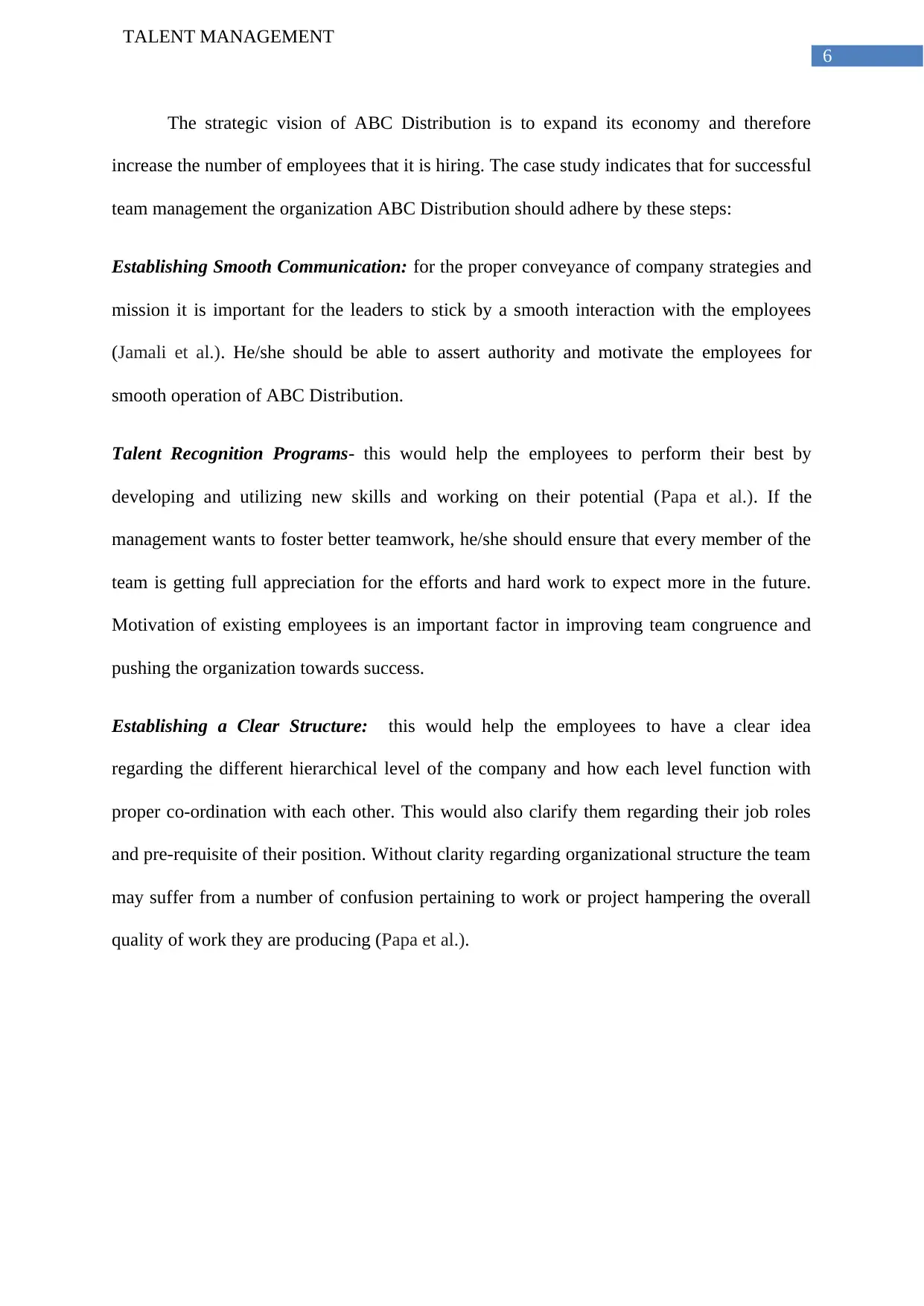
6
TALENT MANAGEMENT
The strategic vision of ABC Distribution is to expand its economy and therefore
increase the number of employees that it is hiring. The case study indicates that for successful
team management the organization ABC Distribution should adhere by these steps:
Establishing Smooth Communication: for the proper conveyance of company strategies and
mission it is important for the leaders to stick by a smooth interaction with the employees
(Jamali et al.). He/she should be able to assert authority and motivate the employees for
smooth operation of ABC Distribution.
Talent Recognition Programs- this would help the employees to perform their best by
developing and utilizing new skills and working on their potential (Papa et al.). If the
management wants to foster better teamwork, he/she should ensure that every member of the
team is getting full appreciation for the efforts and hard work to expect more in the future.
Motivation of existing employees is an important factor in improving team congruence and
pushing the organization towards success.
Establishing a Clear Structure: this would help the employees to have a clear idea
regarding the different hierarchical level of the company and how each level function with
proper co-ordination with each other. This would also clarify them regarding their job roles
and pre-requisite of their position. Without clarity regarding organizational structure the team
may suffer from a number of confusion pertaining to work or project hampering the overall
quality of work they are producing (Papa et al.).
TALENT MANAGEMENT
The strategic vision of ABC Distribution is to expand its economy and therefore
increase the number of employees that it is hiring. The case study indicates that for successful
team management the organization ABC Distribution should adhere by these steps:
Establishing Smooth Communication: for the proper conveyance of company strategies and
mission it is important for the leaders to stick by a smooth interaction with the employees
(Jamali et al.). He/she should be able to assert authority and motivate the employees for
smooth operation of ABC Distribution.
Talent Recognition Programs- this would help the employees to perform their best by
developing and utilizing new skills and working on their potential (Papa et al.). If the
management wants to foster better teamwork, he/she should ensure that every member of the
team is getting full appreciation for the efforts and hard work to expect more in the future.
Motivation of existing employees is an important factor in improving team congruence and
pushing the organization towards success.
Establishing a Clear Structure: this would help the employees to have a clear idea
regarding the different hierarchical level of the company and how each level function with
proper co-ordination with each other. This would also clarify them regarding their job roles
and pre-requisite of their position. Without clarity regarding organizational structure the team
may suffer from a number of confusion pertaining to work or project hampering the overall
quality of work they are producing (Papa et al.).
Paraphrase This Document
Need a fresh take? Get an instant paraphrase of this document with our AI Paraphraser
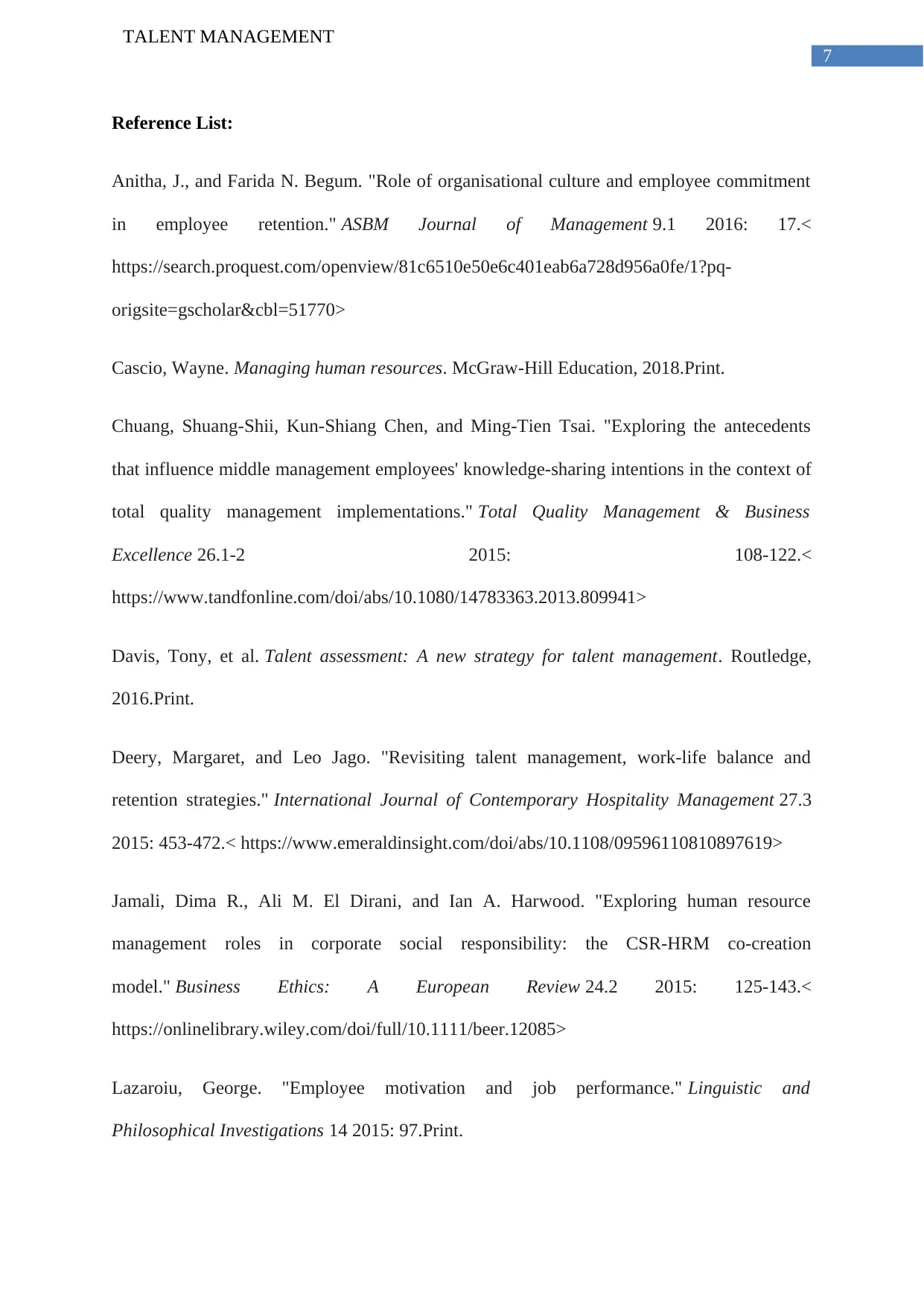
7
TALENT MANAGEMENT
Reference List:
Anitha, J., and Farida N. Begum. "Role of organisational culture and employee commitment
in employee retention." ASBM Journal of Management 9.1 2016: 17.<
https://search.proquest.com/openview/81c6510e50e6c401eab6a728d956a0fe/1?pq-
origsite=gscholar&cbl=51770>
Cascio, Wayne. Managing human resources. McGraw-Hill Education, 2018.Print.
Chuang, Shuang-Shii, Kun-Shiang Chen, and Ming-Tien Tsai. "Exploring the antecedents
that influence middle management employees' knowledge-sharing intentions in the context of
total quality management implementations." Total Quality Management & Business
Excellence 26.1-2 2015: 108-122.<
https://www.tandfonline.com/doi/abs/10.1080/14783363.2013.809941>
Davis, Tony, et al. Talent assessment: A new strategy for talent management. Routledge,
2016.Print.
Deery, Margaret, and Leo Jago. "Revisiting talent management, work-life balance and
retention strategies." International Journal of Contemporary Hospitality Management 27.3
2015: 453-472.< https://www.emeraldinsight.com/doi/abs/10.1108/09596110810897619>
Jamali, Dima R., Ali M. El Dirani, and Ian A. Harwood. "Exploring human resource
management roles in corporate social responsibility: the CSR‐HRM co‐creation
model." Business Ethics: A European Review 24.2 2015: 125-143.<
https://onlinelibrary.wiley.com/doi/full/10.1111/beer.12085>
Lazaroiu, George. "Employee motivation and job performance." Linguistic and
Philosophical Investigations 14 2015: 97.Print.
TALENT MANAGEMENT
Reference List:
Anitha, J., and Farida N. Begum. "Role of organisational culture and employee commitment
in employee retention." ASBM Journal of Management 9.1 2016: 17.<
https://search.proquest.com/openview/81c6510e50e6c401eab6a728d956a0fe/1?pq-
origsite=gscholar&cbl=51770>
Cascio, Wayne. Managing human resources. McGraw-Hill Education, 2018.Print.
Chuang, Shuang-Shii, Kun-Shiang Chen, and Ming-Tien Tsai. "Exploring the antecedents
that influence middle management employees' knowledge-sharing intentions in the context of
total quality management implementations." Total Quality Management & Business
Excellence 26.1-2 2015: 108-122.<
https://www.tandfonline.com/doi/abs/10.1080/14783363.2013.809941>
Davis, Tony, et al. Talent assessment: A new strategy for talent management. Routledge,
2016.Print.
Deery, Margaret, and Leo Jago. "Revisiting talent management, work-life balance and
retention strategies." International Journal of Contemporary Hospitality Management 27.3
2015: 453-472.< https://www.emeraldinsight.com/doi/abs/10.1108/09596110810897619>
Jamali, Dima R., Ali M. El Dirani, and Ian A. Harwood. "Exploring human resource
management roles in corporate social responsibility: the CSR‐HRM co‐creation
model." Business Ethics: A European Review 24.2 2015: 125-143.<
https://onlinelibrary.wiley.com/doi/full/10.1111/beer.12085>
Lazaroiu, George. "Employee motivation and job performance." Linguistic and
Philosophical Investigations 14 2015: 97.Print.
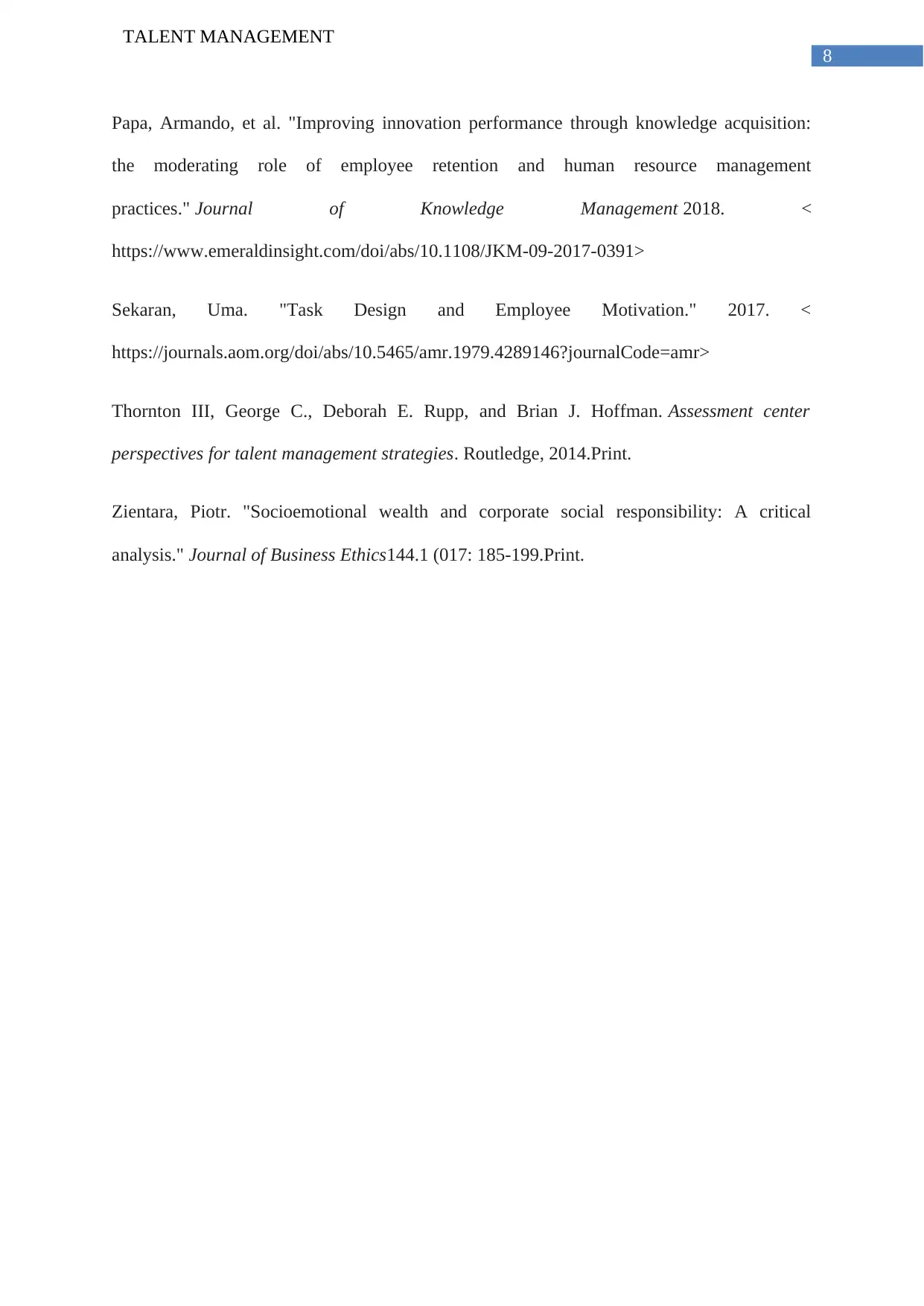
8
TALENT MANAGEMENT
Papa, Armando, et al. "Improving innovation performance through knowledge acquisition:
the moderating role of employee retention and human resource management
practices." Journal of Knowledge Management 2018. <
https://www.emeraldinsight.com/doi/abs/10.1108/JKM-09-2017-0391>
Sekaran, Uma. "Task Design and Employee Motivation." 2017. <
https://journals.aom.org/doi/abs/10.5465/amr.1979.4289146?journalCode=amr>
Thornton III, George C., Deborah E. Rupp, and Brian J. Hoffman. Assessment center
perspectives for talent management strategies. Routledge, 2014.Print.
Zientara, Piotr. "Socioemotional wealth and corporate social responsibility: A critical
analysis." Journal of Business Ethics144.1 (017: 185-199.Print.
TALENT MANAGEMENT
Papa, Armando, et al. "Improving innovation performance through knowledge acquisition:
the moderating role of employee retention and human resource management
practices." Journal of Knowledge Management 2018. <
https://www.emeraldinsight.com/doi/abs/10.1108/JKM-09-2017-0391>
Sekaran, Uma. "Task Design and Employee Motivation." 2017. <
https://journals.aom.org/doi/abs/10.5465/amr.1979.4289146?journalCode=amr>
Thornton III, George C., Deborah E. Rupp, and Brian J. Hoffman. Assessment center
perspectives for talent management strategies. Routledge, 2014.Print.
Zientara, Piotr. "Socioemotional wealth and corporate social responsibility: A critical
analysis." Journal of Business Ethics144.1 (017: 185-199.Print.
⊘ This is a preview!⊘
Do you want full access?
Subscribe today to unlock all pages.

Trusted by 1+ million students worldwide
1 out of 9
Related Documents
Your All-in-One AI-Powered Toolkit for Academic Success.
+13062052269
info@desklib.com
Available 24*7 on WhatsApp / Email
![[object Object]](/_next/static/media/star-bottom.7253800d.svg)
Unlock your academic potential
Copyright © 2020–2026 A2Z Services. All Rights Reserved. Developed and managed by ZUCOL.





